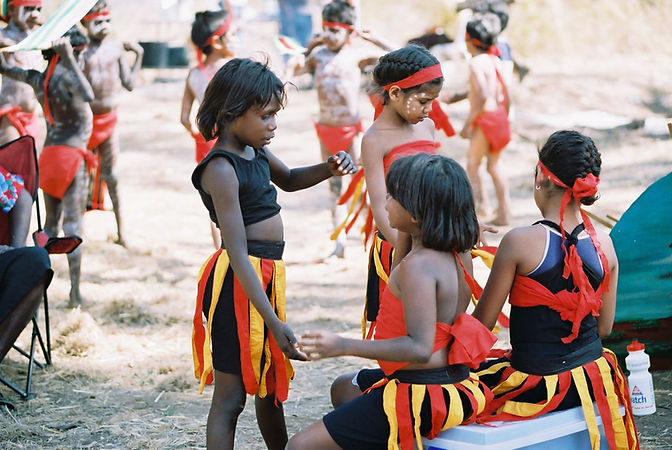
Our Story
The Wilinggin Aboriginal Corporation stands as the voice and advocate for the Ngarinyin People, carrying forward tens of thousands of years of continuous connection to Country in the heart of the Kimberley region of Western Australia. Our name "Wilinggin" reflects our deep spiritual and cultural roots, embodying the strength and resilience that has sustained our people through countless generations.
Founded by Ngarinyin Elders and community leaders, Wilinggin Aboriginal Corporation emerged from our people's determination to maintain cultural sovereignty while navigating contemporary challenges. We are more than an organisation – we are the embodiment of Ngarinyin values, traditional governance, and our unwavering commitment to Country, culture, and community.
Our People / Ngarinyin Culture
The Ngarinyin People are one of the oldest continuing cultures on Earth, with our presence in the Kimberley region spanning over 65,000 years. We are the traditional custodians of Country that encompasses the spectacular landscapes of the Mitchell Plateau, Prince Regent River, Drysdale River, and surrounding areas – some of the most pristine and culturally significant territories in northern Australia.
Our name "Ngarinyin" means "people of the rock Country," reflecting our deep spiritual connection to the ancient sandstone formations, gorges, and escarpments that define our homeland. We are part of the broader Worora-Ngarinyin-Wunambal cultural bloc, sharing linguistic and cultural connections while maintaining our distinct identity, customs, and territorial boundaries.
Ngarinyin language is the heartbeat of our culture, carrying within it thousands of years of knowledge, stories, and ways of understanding the world. Our language encompasses not just words, but concepts of kinship, relationship to Country, spiritual beliefs, and traditional ecological knowledge that cannot be fully translated into English.
Language preservation remains central to our cultural survival. Through our Elders and language keepers, we continue to pass down Ngarinyin to younger generations, ensuring that our unique worldview and cultural expressions remain alive and vibrant.
Ngarinyin society is governed by traditional law that has guided our people since the Dreamtime. Our law system encompasses social organisation, spiritual obligations, environmental management, and protocols for accessing and caring for sacred sites and resources.
Our traditional governance structure recognises the authority of Elders, the importance of consensus decision-making, and the responsibility of each generation to maintain cultural protocols. This system continues to operate alongside contemporary governance structures, ensuring that Ngarinyin law remains central to how we manage our affairs and protect our Country.
For Ngarinyin People, Country is not simply a place – it is our ancestor, our teacher, our provider, and our responsibility. Every feature of the landscape holds spiritual significance, from the mighty Wandjina figures painted on rock walls to the sacred waterholes where our creation ancestors reside.
Our Country encompasses diverse ecosystems, from coastal mangroves to inland escarpments, each requiring specific knowledge and protocols for proper care. Traditional ecological knowledge passed down through generations guides our understanding of seasonal patterns, species behavior, and sustainable resource management.
Central to Ngarinyin spirituality are the Wandjina – powerful creation beings who shaped our Country and continue to watch over our people. These ancestor spirits are depicted in ancient rock art galleries throughout our territory, some of the most significant and well-preserved Aboriginal art sites in Australia.
The Wandjina are not merely subjects of art – they are living spiritual presences that continue to influence weather patterns, seasonal cycles, and the wellbeing of our people. The responsibility to maintain and, when culturally appropriate, refresh these sacred images belongs exclusively to initiated Ngarinyin people according to strict traditional protocols.
Ngarinyin culture is rich with ceremonies, songs, dances, and artistic traditions that connect us to our ancestors and Country. Our ceremonial life includes initiation rites, seasonal celebrations, and healing practices that maintain spiritual balance and cultural continuity.
Traditional skills such as tool-making, bush medicine, hunting techniques, and food preparation continue to be practiced and taught, ensuring that practical knowledge accompanies spiritual and cultural learning.
Ngarinyin society is organised through complex kinship systems that define relationships, responsibilities, and social obligations. Our kinship structure extends beyond immediate family to encompass the entire community, creating networks of support, cultural transmission, and shared responsibility.
Extended family groups maintain connections to specific areas of Country, with particular responsibilities for caring for sacred sites, resources, and cultural knowledge associated with their ancestral territories.
Throughout the challenges of colonisation and social change, Ngarinyin People have demonstrated remarkable resilience in maintaining our cultural identity. While adapting to contemporary realities, we continue to prioritise the preservation and transmission of our cultural knowledge, values, and practices.
Today, Ngarinyin culture remains vibrant through the dedication of our Elders, the enthusiasm of our young people, and the commitment of our community to ensure that our unique way of life continues for future generations. We embrace opportunities to share appropriate aspects of our culture with the broader community while maintaining the sacred and secret elements that are central to our spiritual life.
Ngarinyin culture is not a relic of the past – it is a living, breathing way of life that continues to evolve while maintaining its essential character. Through art, storytelling, ceremony, and daily practice, we keep our culture alive, ensuring that the wisdom of our ancestors continues to guide and inspire our people.
Our young people learn not only traditional skills and knowledge but also how to navigate contemporary challenges while remaining true to Ngarinyin values and identity. This balance between tradition and adaptation ensures that our culture remains relevant and strong.

